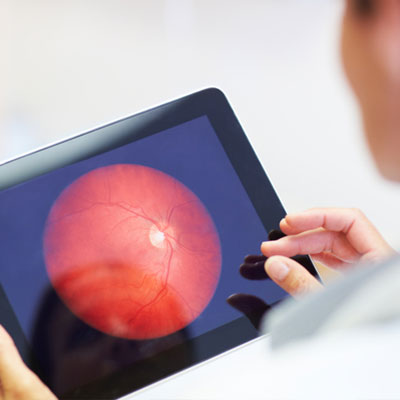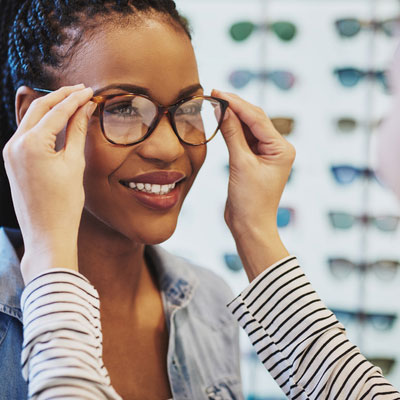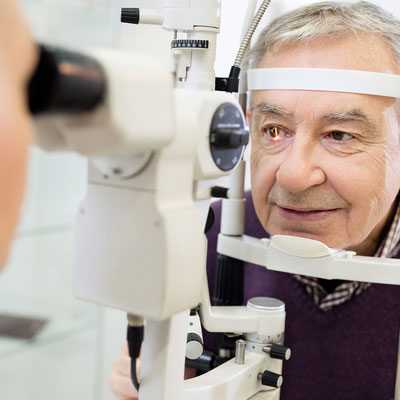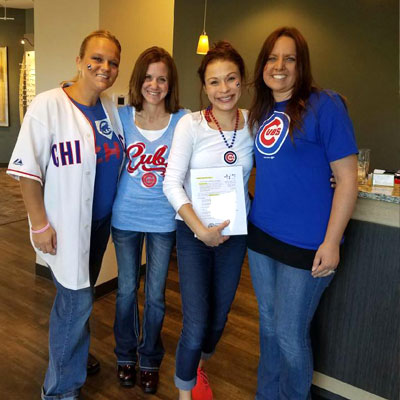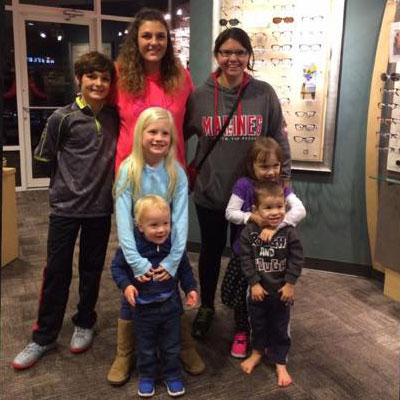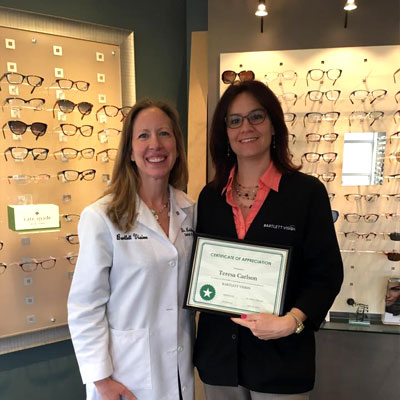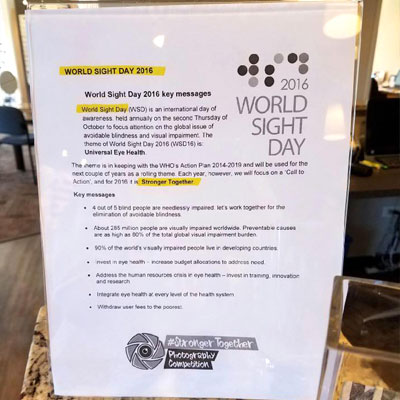Location & Hours
810 W Bartlett Rd
Bartlett, IL 60103-4402
| Mon - Thurs: | 9a - 1p, 2p - 5p |
| Friday | 9a - 12p, 1p - 5p |
| Saturday: | 8a - 12p |
When your eyes feel itchy, it’s a natural reaction to want to rub, rub, rub. It temporarily relieves the itching, and frankly feels great when you’re doing it. Unknowingly, however, you are likely doing short-term – and in some cases long-term – damage to your eyes. Here are some of the detrimental effects that can result from eye rubbing.
- Worsening of ocular allergies: rubbing an eye inflamed from allergies starts a vicious cycle. During the allergic ocular response, a chemical called histamine is released from a cell called a mast cell. It is this release of histamine that starts the red, itchy, watery eyes associated with allergies. Rubbing the eyes releases more histamine, causing the eyes to become more inflamed, perpetuating the cycle.
- Risk of increased eye pressure: Putting pressure on the globe of the eye drastically increases intraocular pressure (IOP). While the effect is temporary, prolonged rubbing can increase your risk of developing glaucoma, a potentially blinding eye disease, especially if the IOP spikes high enough.
- Risk of retinal detachment: Any trauma to the eye can risk detaching the retina, the paper thin film that lines the back of the eye. Retinal detachment can present with symptoms such as seeing flashes, floaters, or a blacking out of the vision, but other times it can go undetected until it’s too late. Rubbing the eye causes unnecessary trauma to the globe, which can rupture the attachment of the retina to the back of the eye.
- Keratoconus: More and more research is starting to show that ocular allergies and eye rubbing is a risk factor for developing keratoconus, a disease in which the cornea starts to bow out and form a cone shape. While the exact cause is not known, research suggests that the contant rubbing weakens the collagen bonds that helps the cornea keep its shape, resulting in the abnormal corneal bowing.
Nothing good comes from eye rubbing. If your eyes are itchy, you can try over-the-counter antihistamine drops, cool compresses (which slows histamine release), and allergy medications to stop the itch.
Article contributed by Jonathan Gerard
The content of this blog cannot be reproduced or duplicated without the express written consent of Eye IQ
Is making an appointment for a comprehensive eye exam for your children on your back-to-school checklist? It needs to be.
No amount of new clothes, backpacks or supplies will help your child succeed in school if they have an undetected vision problem.
The difference between eye exams and vision screenings
An annual exam done by an eye doctor is more focused than a visual screening done at school. School screenings are simply "pass-fail tests" that are often limited to measuring a child’s sight clarity and visual acuity up to a distance of 20 feet. But this can provide a false sense of security.
There are important differences between a screening and a comprehensive eye exam.
Where a screening tests only for visual acuity, comprehensive exams will test for acuity, chronic diseases, color vision and make sure the eyes are working together properly. This means a child may pass a vision screening at school because they are able to see the board, but they may not be able to see the words in the textbook in front of them.
Why back-to-school eye exams matter
Did you know that 1 out of 4 children has an undiagnosed vision problem because changes in their eyesight go unrecognized?
Myopia, or nearsightedness, is a common condition in children and often develops around the ages of 6 or 7. And nearsightedness can change very quickly, especially between the ages of 11 and 13, which means that an eye prescription can change rapidly over a short period of time. That’s why annual checkups are important.
Comprehensive eye exams can detect other eye conditions. Some children may have good distance vision but may struggle when reading up close. This is known as hyperopia or farsightedness. Other eye issues such as strabismus (misaligned eyes), astigmatism or amblyopia (lazy eye) are also detectable.
Kids may not tell you they're having visions issues or even realize it. They may simply think everyone sees the same way they do. Kids often give indirect clues, such as holding books or device screens close to their face, having problems recalling what they've read, or avoiding reading altogether. Other signs could include a short attention span, frequent headaches, seeing double, rubbing their eyes or tilting their head to the side.
What to expect at your child's eye exam
Before the exam, explain that eye exams aren’t scary, and can be fun. A kid-friendly eye exam is quick for your child. After the doctor tests how she sees colors and letters using charts with pictures, shapes, and patterns, we will give you our assessment of your child’s eyes.
If your child needs to wear glasses, we can even recommend frames and lenses best for their needs.
Set your child up for success
Staying consistent with eye exams is important because it can help your kids see their best in the classroom and when playing sports. Better vision can also mean better confidence because they are able see well.
Because learning is so visual, making an eye examination a priority every year is an important investment you can make in your child's education. You should also be aware that your health insurance might cover pediatric eye exams.
With clearer vision, help make this school year their best ever!
After a lot of hard work with EyeMotion, our website company, we’re pleased to be launching our new website. Our goal has been to create a site that would assist you in learning about us, whether it’s finding our location or email form, reading about our wonderful eye doctors, or discovering some of our quality products and services.



